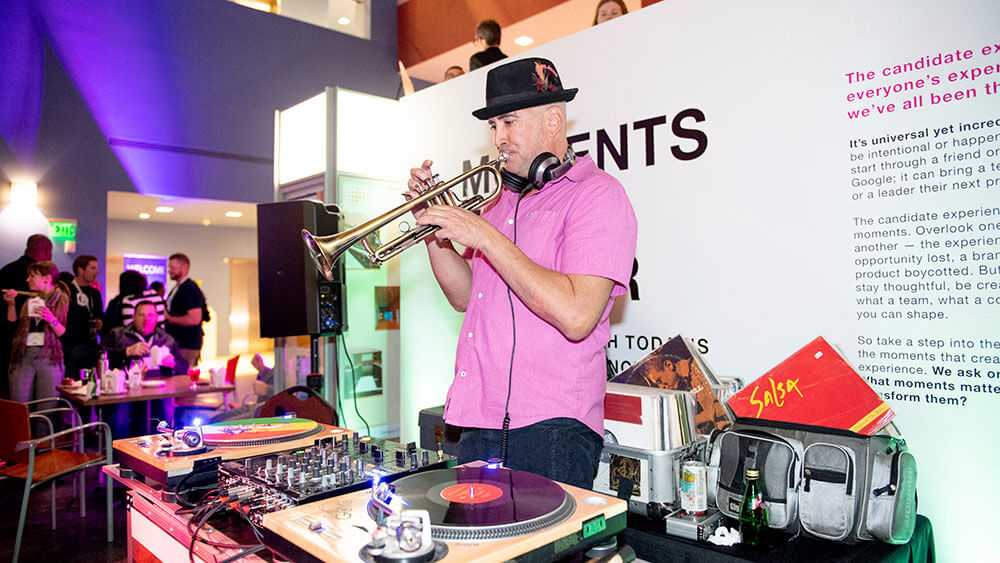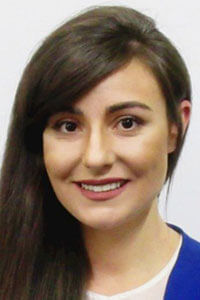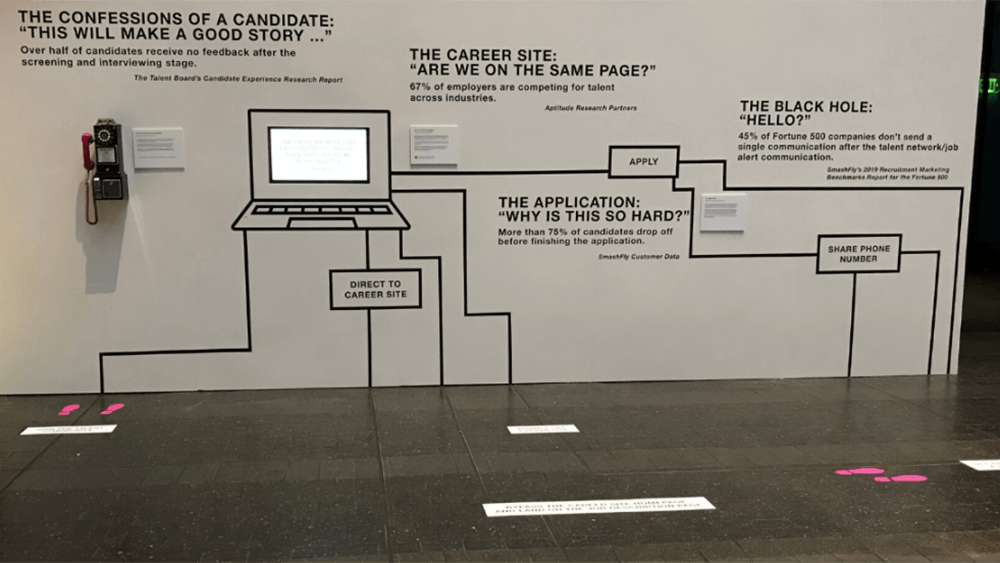
Symphony Talent’s annual conference, Transform, went digital this year, the organizer employed some of the same tactics as a live event, like having a DJ move things along in the virtual environment. (Photos courtesy Symphony Talent)
Gina Alioto, vice president of transformation experience at New York City–based Symphony Talent, was taken with a letter she had read about the so-called death of retail, written by Gary Friedman, chairman & CEO of Restoration Hardware. And she was so inspired by the example Restoration Hardware has set — investing in the in-person experience by transforming historic and landmark buildings into environments where people can interact with the furniture and décor — that she decided to apply that principle to her talent marketing industry.

Gina Alioto
Early this year, Alioto debuted a highly interactive exhibit for HR and talent-acquisition professionals at the Talent Acquisition Week conference in San Francisco, Jan. 28–30 — pre-pandemic times. “That was actually the last in-person event,” she said, “that I, and probably many others, attended.”
Called “Moments That Matter,” the high-touch exhibit — a collection of a variety of items and activities — was designed to help talent-acquisition professionals walk through the candidate experience. As an example, during one part of the candidate journey, HR professional participants could pick up an old rotary pay phone and listen to “confessions of a candidate” — recorded stories from candidates’ good and bad experiences with hiring managers.
“Our industry of talent marketing revolves around people interactions,” Alioto said. “Symphony Talent is a talent marketing solutions provider, and many of the job seeker or candidate touchpoints are digital and involve technology and interactions at scale. There are lots of buzzwords in our space between AI, chatbots, drip campaigns, etc. So our exhibit brought those touchpoints to the physical experience for HR and talent-acquisition leaders — to explore, discuss, and debate the touchpoints and the overall experience — in person.”
Today, in a world that has been reshaped by COVID-19, such a high-touch exhibit on a crowded exhibit floor seems incredibly far off.
And yet, Alioto remains upbeat about digital event possibilities. “Now we physically cannot be together, so those human principles, and our ability to translate them to digital experiences, have become even more important,” she said. “While the human experience can never fully be replicated in the digital experience, there are principles for creating in-person experiences — what brings joy, what creates a memory, how do we connect and interact with people — that we can apply to digital experiences. That separates a one-sided webinar from an interactive digital event experience.”

Symphony Talent’s January in-person event, “Moments That Matter,” was a high-touch exhibit that included attendees picking up an old rotary pay phone to listen to “confessions of a candidate.”
Transforming to Digital
So when Symphony Talent’s annual conference, Transform, which took place in June, had to be moved to an online platform during the pandemic, injecting it with human elements was especially important.
Some of the strategies Alioto said the company employed to keep the participants engaged included distilling the two-day in-person event down to a one-day, five-hour virtual event. The agenda featured some live components and some prerecorded content. “I think the audience tends to be a little bit more forgiving when you have some live components,” she said. “There’s something to be said about radio, for example, where there’s someone on the other side of the radio waves, live, delivering you the news or the music versus trying to listen to a podcast where it’s frozen in time.” So live hosts and a DJ helped to move the program along, in addition to a mixologist during happy hour.
In addition, attendees were shipped “experience boxes” and were prompted during the online event to open up different pieces together as a community — “things that you can touch, smell, taste,” Alioto said. “The purpose of the box was to bring the human senses in, which is one of the primary ways that you create memories.”
In a way, Alioto said, “marketers and event producers were built” for these uncertain times. “It’s safe to say that no one has ever produced virtual events during a global pandemic before — it’s liberating because it’s uncharted waters and there are no rules. Now is the time for creativity and innovation for virtual events.”
Michelle Russell is editor-in-chief of Convene.
